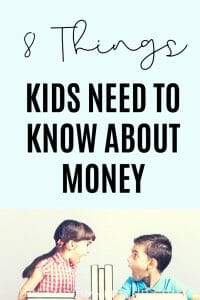Financial Literacy For Kids – 8 Things All Kids Should Know About Money

8 Things All Kids Should Know About Money
I’ve spoken about the fact before that when it comes to learning about money and financial literacy most of our education comes from our home.
That is, money lessons start from an early age.
Whether we are conscious or not, it is these early money conversations that usually determine whether we grow up to have a healthy or unhealthy relationship with money.
I’m guessing your goal too is to raise children with a healthy mindset towards money.
Think about a lot of adults in this world: they spend more and save less than they should.
They buy things they don’t really need and fail to give money the respect it deserves.
One big purchase on a credit card can result in payments that never seem to end. It doesn’t take much for some adults to spiral out of control.
A young child who is witnessing this money behavior often grows up believing that this is the normal way to interact with money.
They don’t know any different because they have never been TAUGHT anything different.
In reality it is not that difficult to teach children the basics of money and financial literacy for kids.
The concepts of spending, saving and sharing money are important for them to learn as they too will need to make choices in these areas as they grow older.
You can give your child the gift of financial literacy for kids starting from an early age by discussing with them these ideas:
FINANCIAL LITERACY FOR KIDS TIP #1
1 – They need to understand the real cost of what you’re buying
A $500 stereo doesn’t just cost $500.
If that money was invested elsewhere at 10%, $500 could grow to almost $27,000.
This is commonly referred to as opportunity cost.
Children need to know that money has the opportunity to GROW when invested wisely.
That is why it is so important not to spend it frivolously on things you don’t really need.
If you spend your money on something, that money isn’t available for anything else, like investing.
FINANCIAL LITERACY FOR KIDS TIP #2
2 – Show your child how to use a simple savings calculator
These free calculators are available all over the internet and are a great way to show your kids what can be accomplished by consistently saving a little money each month.
I remember someone asking me as a kid whether it was better to get $100 every day for 30 days (which in theory sounded great $3000 woohoo!) or to get a measly PENNY and have that doubled instead every day.
Most kids would scoff at the one cent piece like I did until they discover that a penny doubled every day for 30 days equals $5,368,709.12 by the end of the month.
I’m not kidding.
Do the math yourself.
That’s a pretty impressive difference.
FINANCIAL LITERACY FOR KIDS TIP #3
3 – Teach your kids about debt.
The average household has over $7,000 in credit card debt.
This does not include the additional debt of mortgage repayments.
When kids go to college, they’re usually inundated with credit card offers from the first day on campus and they need to understand that credit cards DO NOT EQUAL FREE MONEY.
Oh no, they do not.
Whatever they charge on their card, they need to be able to pay for. Ideally they should have the money in advance.
This absolutely needs to be explained to kids so they don’t fall into the debt trap.
FINANCIAL LITERACY FOR KIDS TIP #4
4 -Teach your kids how to save
Most of us pay our bills, have a little fun, and then plan to save whatever is left.
But there’s rarely ever anything left with that approach.
This is definitely the wrong way to do it!
Always save first!
Teach your child to immediately save 25-50% of every dollar they earn when they are still young.
Don’t you wish that you had done the same?
Before they know it they will be 18 and life is so much easier when you are sitting on a little nest egg that provides you with more opportunities in life.
FINANCIAL LITERACY FOR KIDS TIP #5
5 – Teach your kids to be giving
Allow your child to choose a favorite charity and contribute to it.
For a young child, it might be just a few dollars but that is enough to make them feel as if they are more generous and compassionate members of society.
Your child will ultimately come to see that giving affects them as much as it does the person or organization receiving the money.
How is this so?
Because being generous will make their little hearts grow.
FINANCIAL LITERACY FOR KIDS TIP #6
6 – Make them work during the summer
All teenagers want more money so give them the chance to earn it.
Being able to hold down a job is an important stepping to adulthood and prepares them for the real world.
This is how teens learn real-world money-management skills and more important, the true value of money.
When you have worked hard for that $50 most feel less inclined to throw it away on things that don’t really matter.
FOR OLDER TEENS – YOUNG ADULTS
FINANCIAL LITERACY FOR KIDS TIP #7
7 – Start building their credit
Establishing a good credit score when they are older will help make your adult child’s life so much easier.
Credit scores demonstrate a proven history of being able to pay off your debts to companies that loan you money.
A good credit score also indicates you are able to pay your bills off in time which is critical as the higher your credit score, often the better your mortgage terms.
Most young adults are unable to purchase a home for several years, often due to a lack of credit history.
Get started early.
When you child goes off to college, make sure that they choose a credit card with a low rate and no annual fee.
Teach them how to use the card wisely.
My recommendation is ALWAYS to pay the credit card off in full at the end of every month.
FINANCIAL LITERACY FOR KIDS TIP #7
8 – Teach them how to evaluate a credit report
After some credit building activities, teach your child how to view their credit report and check for errors.
The majority of credit reports have errors, typically not in your favor.
You won’t be able to correct them if you don’t identify them in the first place.
All in all, money plays an important part in life.
Money helps provides security, opportunity, and a greater ability to help others when used wisely.
The good news is you have a lot of control over the financial habits your children develop.
It is up to you to teach your child these money skills!Â
It is your job to teach your child how the world works and money is a massive part of it.
Their respect, value for and understanding about money will often come down to the things they learn as a child.
Help your kids to have a successful relationship with money by teaching them financial literacy skills they need to know.
Help them understand never to spend money before they have earned it.
Teach them that the more they learn the more potential they have to earn.
Teach them not to work for money but to work for freedom.
These lessons I have highlighted above can be all taught by you from the comfort of your own home.
If you enjoyed this post, please feel free to share it!








